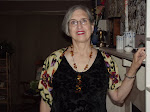On March
12, NPR's Diane Rheum Show hosted a panel discussion about "The
Battle for Women's Votes." I tuned in after the introductions were made
and listened for quite a while before I knew who the three guests were.
One of the panelists presented her points of view in a harsh and harridan-ish
way, scolding and chastising the other guests and speaking very derisively of
everyone whose comments she did not like. A picture arose in my mind as I
listened to her: Sister Mary Scary, nine feet tall, six feet wide, wooden ruler
in hand, ready to deliver retribution to anyone who looked like they might
start trouble. (Is it obvious that I attended Catholic school during my
formative years?)
When the host reintroduced everyone, it all became clear. The harridan-ish
person was an actual, bonafide harridan, Phyllis Schlaffly. Younger people may
not know who Phyllis is. Lucky you. She is an Catholic Illinoisan who became
the extremely vocal and exceedingly nasty leader of the anti-choice movement
beginning in the early 1970s. (A little history lesson: repressive
anti-abortion laws in the USA were overturned by the Supreme Court in 1973.)
I lived in St. Louis, Missouri at the time and found it very difficult to
escape Phyllis's harping and screeching anti-choice venom. She also
espoused a very fundamentalist, anachronistic view of women's position in
marriage and society. I could not stand Phyllis or her political and social
agenda and I felt disappointed on Monday to discover that she hadn't gone the
way of the dinosaur yet. Aside from her comments, I found the program very
interesting.
The other two guests were Terry O'Neill, president of the National Organization
of Women, and Karen Tumulty, a national political reporter for the Washington
Post. Terry O'Neill made a comment that riveted me. She said that the
2010 national and state legislature election outcomes were
severely affected by an unusually low turnout of women voters. (O'Neill cited a
study to support this, which I can't remember, so you'll have to listen to the
program on Diane Rehm's podcast if you want those details.)
According to this study, O'Neill said, an extraordinary number of
ultra-conservative and fundamentalist-leaning candidates gained office because
women did not vote. O'Brien and Associates blog post of February 24,
2012, states, "However, according to O’Neill, the total number of
women voters dropped in 2010, particularly unmarried women, who traditionally
vote more progressively and Democratic. Married women tend to become more
Republican."
So what difference did a little apathy on the part of women make? Just this.
Over 1,000 anti-women bills (meaning anti-choice, anti-birth control,
anti-equal rights, etc.) have been introduced at the state level since 2010 and
over 100 of them have passed. And we've all seen what's been happening in
Washington. Did you wonder why we suddenly had this spate of dangerous
legislation like forcible sonogram bills? Now you have the answer.
Women got fed up and stayed home from the polls. The number of women in
national elected office suffered, too. As quoted in the O'Brien and Associates
blog I mentioned earlier, O'Neill states, “In 1992, the number of women
in Congress increased from 5 percent to 10 percent. And in 2010, we lost women
in Congress largely in part because of women not voting.”
My contemporaries and I worked hard, really hard, in the 1960s and
1970s to overcome paternalistic and misogynistic laws and attitudes in the
United States. I speak for many women when I say that, as members of the last
generation that witnessed the horrors of illegal abortions first
hand, pro-choice and pro-birth control legislation has the
greatest significance for us. We are now the older generation. We still
support these causes, although I, for one, admit to utter weariness with
fighting the same battles again and again.
What do we do? Oddly enough, the answer appears to be quite simple. Vote. I'd
like to say "Vote early and often," the old canard from Chicago's
Daley-machine days, but that would be wrong. Just vote once, but do vote. Even
if your vote is different from mine, even if you support things that I think
are awful, vote. Women have the potential to powerfully affect election
outcomes and we need to exercise that power this year. If the
ultra-conservatives get a stronger grip on this country in November, it may be
the last opportunity we have for quite a while.
Fight back with your vote.
Subscribe to:
Post Comments (Atom)






No comments:
Post a Comment